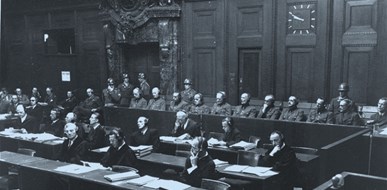Conference on Honest Errors and Combat Decision Autonomy
Published 17 May 2021
On 4 June 2021, the DILEMA Project is co-organising a Conference on ‘Honest Errors? Combat Decision Autonomy 75 Years After the Hostage Case’. The conference is co-organised with the Centre for International and Operational Law (Swedish Defence University), the VID Specialized University, and the Lieber Institute for Law & Land Warfare (United States Military Academy at West Point).
Click here to register for this conference.
Background
In late 1944, German forces under the command of Colonel General Lothar Rendulic devastated Finnmark, Norway’s northern- and easternmost county that adjoins Russia. Rendulic was tried before a Nuremberg-based US military tribunal for this incident. He asserted that he honestly, albeit erroneously in hindsight, believed that a Soviet attack was imminent, and that scorching earth was the only effective and proportionate policy to hinder enemy advances. The judges acquitted him, noting their obligation to approach the situation “as it appeared to the defendant at the time”. This ruling, issued in the 1948 case known as Hostage, laid the foundation for the so-called “Rendulic Rule”, a key principle of modern customary international humanitarian law.
Three quarters of a century later, the idea that commanders making difficult decisions in good faith ought to be protected from wholesale retrospection remains intuitively sound. And yet unresolved questions surrounding the actual state of Rendulic’s knowledge, devastation’s suitability as a means to counter his perceived threat, and the scale of the property destruction and population displacement carried out in view of their stated purpose, linger. Nor do we clearly understand the Rendulic Rule’s emergence, content and significance under international humanitarian law, or how it relates to the reasonable commander test and mistake of fact as a defence plea in international criminal law.
Combat Decision Autonomy: 75 Years After the Hostage Case
Today’s operational environment surrounding combat decisions has become even more complex. Controversial military action often reverberates far beyond its immediate context. The decision’s motives and purposes, the quality and quantity of the information available as well as the honesty of its assessment, the fitness of the action chosen vis-à-vis the aim sought, the balancing of competing interests such as force protection and civilian safety, and the like, are bound to receive detailed scrutiny from numerous angles as a result. The advent of artificial intelligence, deep learning and unprecedented computing power in modern combat decision-making will only complicate the matter further.
At this conference, a multidisciplinary team of eminent historians, international lawyers, strategic thinkers and military ethicists offers a definitive account of Finnmark’s devastation, Rendulic’s acquittal, and the no second-guessing rule’s strategic, legal and ethical significance in the age of increasing autonomy in combat decision-making. What does it mean for the relevant information to be reasonably available to the decision-maker – human or otherwise? What counts as its honest assessment, and when is accountability engaged? These are among the matters our speakers address as we approach Hostage’s 75th anniversary in 2023.
Programme
For more information on the programme, speakers, and registration details, please click here.

